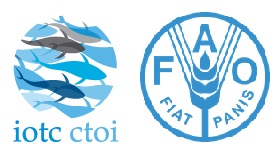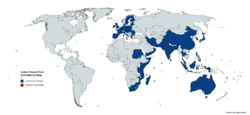Indian Ocean Tuna Commission facts for kids

Logo of the Indian Ocean Tuna Commission
|
|

Indian Ocean Tuna Commission Map
|
|
| Abbreviation | IOTC / French: Commission des Thons de l'Océan Indien (CTOI) |
|---|---|
| Formation | 27 March 1996 |
| Type | International organization |
| Purpose | Fisheries |
| Headquarters | Victoria, Seychelles |
|
Area served
|
Indian Ocean |
|
Membership
|
30 state members |
|
Executive Secretary
|
Paul de Bruyn |
The Indian Ocean Tuna Commission (IOTC) is an important group that helps manage tuna fishing in the Indian Ocean. It makes sure that tuna are caught in a way that keeps their populations healthy for the future. IOTC started in 1996.
This group was created by an agreement, like a special promise, approved by the Food and Agriculture Organization of the United Nations in 1993. This agreement became official in 1996 when enough countries agreed to follow it. Any country with a coast on the Indian Ocean, or any country that fishes for tuna there, can join this agreement. Other groups that represent many countries can also join.
IOTC's main office is in Victoria, Seychelles.
The IOTC took over from an older program called the Indo-Pacific Tuna Development and Management Programme, which started in 1982.
Who Are the IOTC Members?
As of July 2024, there are 29 countries and one organization that are members of the IOTC. These members work together to make decisions about tuna fishing.
Some countries have been members in the past but are not anymore. Vanuatu was a member between 2012 and 2015. Eritrea was a member until 2023, when it decided to leave the organization. Liberia works with the IOTC but is not a full member.
The UK's Role in IOTC
In May 2022, the Food and Agriculture Organization shared a legal opinion about the United Kingdom's role. This opinion suggested that the UK should no longer be seen as a "coastal state" in the Indian Ocean. This is because of a disagreement about the Chagos Archipelago islands.
A United Nations resolution from 2019 stated that the Chagos Archipelago is part of Mauritius. Because of this, the UK is now considered a country that fishes in the region, but it does not have the same rights or duties as a country with a coastline in the Indian Ocean under the IOTC rules.
See also
 | Tommie Smith |
 | Simone Manuel |
 | Shani Davis |
 | Simone Biles |
 | Alice Coachman |

